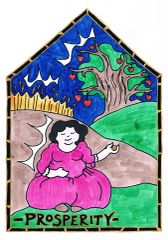Prosperity
m (reversion) |
|||
| Line 1: | Line 1: | ||
{{CaptionedImage|file=ChildPrimer5.jpg|width=168|height=240|align=left|caption=From ''A Children's Primer of the Way''}} | {{CaptionedImage|file=ChildPrimer5.jpg|width=168|height=240|align=left|caption=From ''A Children's Primer of the Way''}} | ||
==The Path of Prosperity== | ==The Path of Prosperity== | ||
To the one without Virtue, Prosperity is oft misunderstood as the pursuit of wealth and luxury, yet neither the wealthy miser, gluttonous sot or lucky gambler can truly be called Prosperous. True Prosperity is the culmination of effort and labour, sweat and toil, and celebrating the fruits of that labour. The Prosperous are: the farmer who toils to bring in the harvest and enjoys their bounty; the magician who strives to master a magic and then uses their newfound art; the merchant who competes fiercely for each coin they earn and then spends it in celebration. True Prosperity enriches those around them as well as the individual, and so what may seem the pursuit for the sake of the self is to the benefit of the many. | |||
The | |||
===Guidance on the Path=== | ===Guidance on the Path=== | ||
Revision as of 23:42, 9 May 2013
The Path of Prosperity
To the one without Virtue, Prosperity is oft misunderstood as the pursuit of wealth and luxury, yet neither the wealthy miser, gluttonous sot or lucky gambler can truly be called Prosperous. True Prosperity is the culmination of effort and labour, sweat and toil, and celebrating the fruits of that labour. The Prosperous are: the farmer who toils to bring in the harvest and enjoys their bounty; the magician who strives to master a magic and then uses their newfound art; the merchant who competes fiercely for each coin they earn and then spends it in celebration. True Prosperity enriches those around them as well as the individual, and so what may seem the pursuit for the sake of the self is to the benefit of the many.
Guidance on the Path
Through study of the Paragons and Exemplars, the priests of The Way have gleaned insight into the heart of the Virtue and how best to pursue it. There are collections of parables, tales, sayings and teachings that distill this for Imperial Citizens to learn from. The following are a handful of teachings and sayings deemed to be essential to understanding the Path:
- Strive, toil, and claim the just rewards of your labours.
- Enjoy the fruits of your labour today; no one knows what the morrow holds.
- There are three things that should never be made: Food that goes uneaten, coin that goes unspent and magic that goes unused.
- The Prosperous are not selfish; all that is worthwhile is shared with those who deserve it.
- Despise the thieving bandit, the lazy wastrel, the grasping miser and those who take without giving.
Paragons and Exemplars
Paragons and Exemplars of Prosperity are considered reasonably easy to identify owing to their efforts and labour, and how they use - or share - the fruits of those labours. Recognised Paragons and Exemplars of Prosperity include:
- The legendary Paragon Good Walder of the Marches.
- The Exemplar known as The Little Mother, whose tireless work helped to establish the importance of charitable deeds in The League.
- The Exemplar Long Tom Goodfellow, the healer and brewer whose legacy still encourages pilgrimages today.
- The Exemplar Zemress, the Blade of the Isles, who not only encouraged hard work and investment, but also the importance of taking-up of arms to defend what is yours.
Symbols, icons and trappings
The Path of Prosperity has many symbols across the Empire but one of the most common is the Wheatsheaf. This is symbolic of harvest time, which is widely known as a time of prosperity. Many Priests and Pilgrims of this Path may have a stalk of wheat or other grain upon them. Along similar lines an Apple or a Cup or a Coin are known symbols of this Path.
It is quite common for Priests and Pilgrims of the Path of Prosperity to carry waterskins, or bear fruit or other food, to enjoy or share as Virtue guides them. It is not unusual for some to also carry an oaken club as Good Walder did.
Further Reading
- You can learn about the various spiritual roleplaying effects created by priests dedicated to Prosperity here.
- You can learn about the skills that priests can use to support the virtue of Prosperity here.
